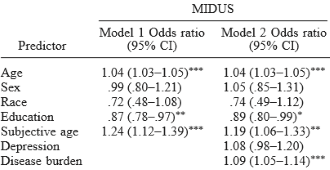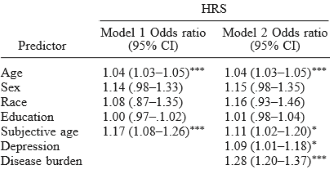|
Subjective age says more about chance of serious illness than objective age
How old you feel says more about your health than how old you really are. This is suggested by a meta-analysis that the French socio-psychologist Yannick Stephan, at the University of Montpellier, published in Health Psychology. The older you feel, according to Stephan's figures, the greater the chance that you'll be admitted to hospital within the foreseeable future.
Study
Stephan used data on over ten thousand people aged between 24 and 102. The data had been gathered in three studies: the Midlife in the United States Survey (MIDUS), the Health and Retirement Study (HRS) and the National Health and Aging Trends Study (NHATS). In these studies researchers had interviewed the participants and kept track of whether they had been admitted to hospital in the year after the interview took place.
Results
The tables below show that age is a risk factor in hospital admissions. That's logical: the older you are, the more vulnerable you are. But in all three studies subjective age is a better predictor than objective age. At first sight [Model 1] subjective age is 4-6 times more accurate in predicting hospital admission than objective age.



Of course you can feel old because you're depressed or already ill [Disease burden], but when Stephan filtered these factors out [Model 2], the subjective age still said 2-4 times more about the chance of hospital admission than the objective age.
Mechanism
In 2015 Stephan published a study in which he showed that elderly people had less of the inflammatory factor CRP in their blood the younger they felt, and more the older they felt. [Brain Behav Immun. 2015 Jan;43:33-6.] According to a recent Polish study, inflammatory factors such as CRP speed up the aging process.
Conclusion
"This study provides new evidence that subjective age, a biopsychosocial marker of aging, is a consistent predictor of hospitalization across three large national samples of middle age and older adults," the researchers wrote. "Subjective age assessment can help identify individuals at greater risk of hospitalization, who may benefit from prevention and intervention efforts."
Source:
Health Psychol. 2016 Jun;35(6):634-7.
More:
Steroids and (pretty bad) protein shakes keep old people out of hospital 21.02.2009
Archives:
Psychology of Longevity
Psychology
Longevity
|






